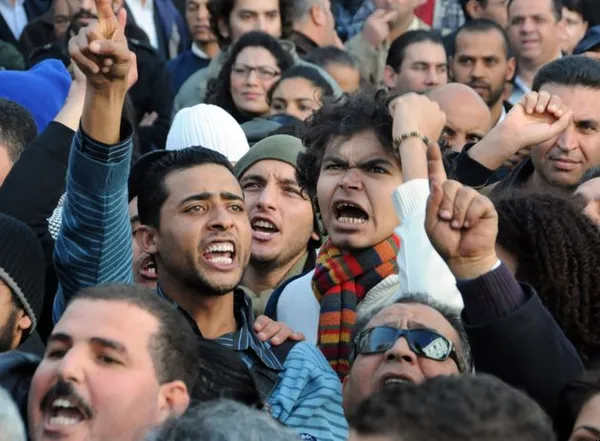Eye For Film >> Movies >> How To Start A Revolution (2011) Film Review
How To Start A Revolution
Reviewed by: Amber Wilkinson

Dr Gene Sharp is a long way from being a household name - and, at 83, and softly spoken, a long way from most people's idea of a revolutionary. Yet his philosophical writings concerning the way to wage a non-violent war against dictatorships have become a touchstone for peaceful protesters in countries as disparate as Burma, Serbia and Egypt.
This gentle, informative and optimistic documentary acts as a beginner's guide to the Nobel Peace Prize nominee, the tenets of his book From Dictatorship To Democracy (which is available to read online free, here) and to the places in the world where his words have had a surprisingly big impact.

Director Ruaridh Arrow starts by showing the man himself, working from his home office in Boston, at the non-profit Albert Einstein Institution that he founded in 1983, whose mission "is to advance the worldwide study and strategic use of nonviolent action in conflict". It seems unlikely that this handful of rooms and just one member of additional staff - executive director Jamila Raqib - should be making waves across the globe and yet, as Arrow's documentary will go on to illustrate, just because it seems improbable does not mean it is impossible. Although, as Sharp admits himself: "That's always a problem, describing my work."
As if to somehow prove that pens - and by extension, those who read the words they write - are mightier than the sword, Sharp's detailed assessment of "198 non-violent weapons", have become part of the armoury of hundreds of thousands of people attempting to overthrow dictators without bloodshed. Lying among the arsenal is everything from "rude gestures" to "civil disobedience" to "writing signs in English" and "mock funerals".
Arrow illustrates many of these points with real-life archive footage of Sharp's suggestions being put into protest everywhere from Sudan to Ukraine. The documentarian goes on to show us his quiet day-to-day life - when asked how he feels about how his words have spread he says "I'm still amazed" - while Raqib and Retired US Army Colonel Robert Helvey, who uses Sharp's teachings to train would-be revolutionaries, talk about the man and his work.
Among the others who sing his praises are the founding member of Serbia's peaceful revolutionary youth movement OPTOR, Srdja Popovic, leading Syrian activist Ausama Monjad and anti-Mubarak orchestrator Ahmed Maher. All talk about the strength and organisation they have garnered from his words, with the talking heads intercut with some excellent archival footage showing the words in action.
Among the more interesting aspects are Sharp's emphasis on planning - he refers rather bleakly to the "bravery" of the Tianamen Square protests, which he says failed because they "really didn't know what they were doing". It's also interesting to note that he is a pragmatist and never gets involved in offering specific advice, being of the belief that everywhere is different and only those who are attempting to exert change really know what the lay of the land is like in their specific country.
Although in many ways global in scope, the documentary's parameters remain rather narrow in terms of Sharp himself. Aside from briefly exploring claims that he is in some way a CIA stooge - quickly (and no doubt rightly) brushed off - this is very much a celebration of the man that doesn't open things up for a great amount of debate. Everyone here is firmly Team Gene and it would have been interesting to hear a little more from independent observers - perhaps fellow academics or experts - about the impact of his work.
Arrow, who was formerly a producer with Channel 4's Dispatches, shows his TV roots a little in the decison to highlight Sharp's nurturing of orchids as a metaphor for peace, which feels somewhat forced in this longer film format, while John Keltonic's score occasionally sweeps into unecessary heavy-handedness.
This is nonetheless a documentary that has, in the light of the Arab Spring, never been more relevant and offers a humanistic and optimistic flipside to the all-too frequent films detailing nothing but seemingly unending, bloody conflict. Although it only received its world premiere, at Boston Film Festival, last month, it has already picked up the best documentary and mass impact award there and was named best documentary at Raindance. It could easily go on to pick up more awards, especially from audiences who will no doubt find its upbeat tone, unlikely but likeable central figure and easy-to-get-behind message hard to resist.
“I dream that the oppressed people of the world will be able to learn... that this type of nonviolent struggle can be used to liberate all oppression and replace military and violent conflicts," says Sharp. Now that's a dream we'd all like to see become a reality.
Reviewed on: 11 Oct 2011
















